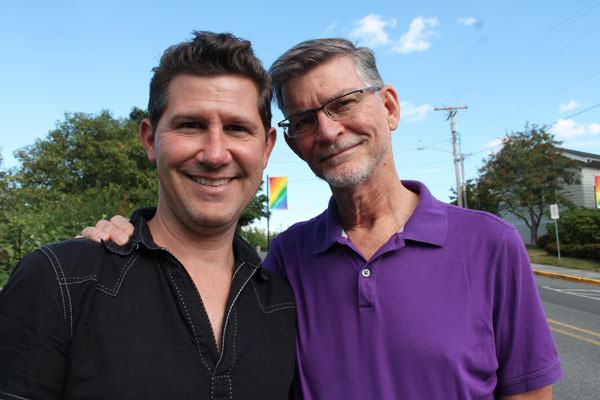Langley will become awash in chants, cheers and plenty of rainbows Sunday for the second annual Whidbey Queer Pride Parade.
Organizers brought back the march through downtown Langley after having a successful first year. The number of marchers was so high in 2014’s parade that the Aug. 2 route was extended this year to prevent the front from lapping the back of the procession.
“Last year, we had so many people that the parade ate its own tail,” said co-founder and co-organizer Bonnie Stinson. “We didn’t know it was going to be so big.”
People lined downtown sidewalks to watch the first official Whidbey Island celebration of all things different. Stinson and her fellow co-founder, Kathryn Lynn Morgen, created it in the style of other metropolitan pride parades but gave it a Whidbey-esque treatment to include all people who wish to self identify.
Using the word queer, once and still used as a derogatory term, was an all-encompassing description, Stinson said. It covers lesbian, gay, bisexual, transgender, questioning, intersex and asexual (LBGTQIA) people, as well as anyone who wants to determine for themselves their sexuality and gender identity.
“Queer is the best way to provide freedom for people to self identify,” Stinson said, adding that both organizers understand the concern over using the word. The goal is to reclaim an ugly and exclusionary term and turn it into something beautiful and inclusive.
“Everyone has the absolute freedom to not identify as queer,” she added.
This year’s grand marshal, Charlie Murphy, remembers a time when the United States was not a welcoming place for a gay man. Murphy, who splits his time now with husband Eric Mulholland between Langley and Seattle, was a professional musician in the 1970s at the time of the gay rights movement. The couple described their meeting as a “love-at-first-sight thing,” and they have been together more than a decade.
Murphy recalled performing with his band, Rumors of the Big Wave, around the time gay rights activist Harvey Milk was assassinated. It was, at times, a dangerous era to be an “out” homosexual.
“Those were wild years,” Murphy said in between sips of tea at an outdoor table on Second Street in Langley, six days before the parade would pass by the area. “Sometimes people had to cross picket lines to get to the concerts.”
Morgen and Stinson selected Murphy (and by proxy his husband Eric Mulholland) to lead the parade this year because of his lifelong dedication to equal rights and his founding and work with Partners for Youth Empowerment. The agency works with young people and trains them in myriad skills. Since being created in 2008, more than 14,000 youths have been trained across the globe, Murphy said.
“I love that he’s an example of empowerment not just for the queer community, but an upstanding human,” Stinson said.
“He’s just a prime human being example who happens to be gay,” she added.
Both Murphy and Mulholland, who were first married in 2006 before it was legal in Washington, are longtime pride parade participants. They later legally married and continued their involvement and activism. Murphy, who spent nearly two decades as a professional musician, was also a performer at several major cities’ parades, including San Francisco.
Murphy said he urged caution to the LGBTQIA community and its allies. He was not able to quiet the fearful side of himself that worries about a strong reaction to last month’s United States Supreme Court ruling in favor of allowing marriage equality.
“It’s easy to think that everything is OK because we can marry, but there are still gay bashings on Capitol Hill,” Mulholland said.
While Mulholland and Murphy remember more dangerous times, they were still able to reflect on the advances the equality movement has made. During a celebration of the June ruling in Langley, some of Murphy’s music celebrating gay culture was played.
“The world is changing, and so rapidly,” Mulholland said.
For Stinson, seeing the festival grow and receive such large amounts of support was humbling and gratifying. Having created a well-attended and much-celebrated pride parade from nothing was all the satisfaction she needed.
“I’m really grateful and impressed that people are coming out for this kind-of informal event,” Stinson said.
“It was already here, we just gave it a date,” she added.



